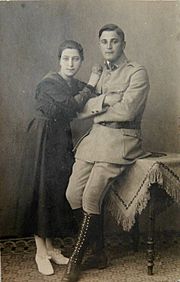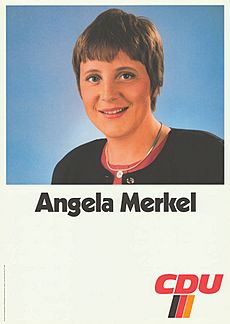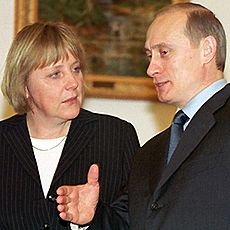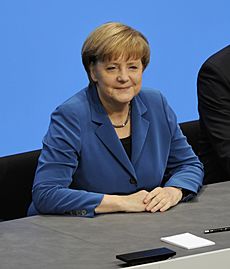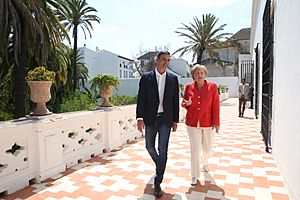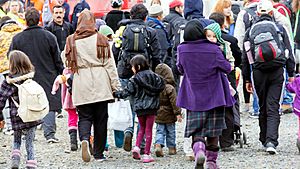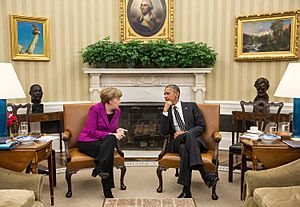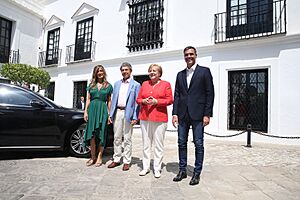Angela Merkel facts for kids
Quick facts for kids
Angela Merkel
|
|||||||||||||||||||||||||||||||||||||||||||||
|---|---|---|---|---|---|---|---|---|---|---|---|---|---|---|---|---|---|---|---|---|---|---|---|---|---|---|---|---|---|---|---|---|---|---|---|---|---|---|---|---|---|---|---|---|---|
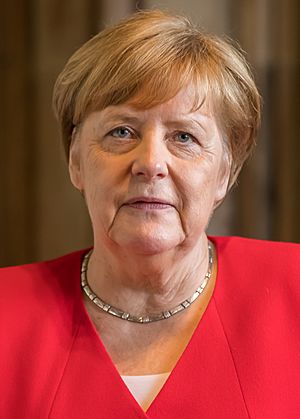
Merkel in 2019
|
|||||||||||||||||||||||||||||||||||||||||||||
| Chancellor of Germany | |||||||||||||||||||||||||||||||||||||||||||||
| In office 22 November 2005 – 8 December 2021 |
|||||||||||||||||||||||||||||||||||||||||||||
| President |
|
||||||||||||||||||||||||||||||||||||||||||||
| Vice Chancellor |
See list
|
||||||||||||||||||||||||||||||||||||||||||||
| Preceded by | Gerhard Schröder | ||||||||||||||||||||||||||||||||||||||||||||
| Succeeded by | Olaf Scholz | ||||||||||||||||||||||||||||||||||||||||||||
| Leader of the Christian Democratic Union | |||||||||||||||||||||||||||||||||||||||||||||
| In office 10 April 2000 – 7 December 2018 |
|||||||||||||||||||||||||||||||||||||||||||||
| General Secretary |
See list
|
||||||||||||||||||||||||||||||||||||||||||||
| Deputy |
See list
|
||||||||||||||||||||||||||||||||||||||||||||
| Preceded by | Wolfgang Schäuble | ||||||||||||||||||||||||||||||||||||||||||||
| Succeeded by | Annegret Kramp-Karrenbauer | ||||||||||||||||||||||||||||||||||||||||||||
| Leader of the Opposition | |||||||||||||||||||||||||||||||||||||||||||||
| In office 22 September 2002 – 22 November 2005 |
|||||||||||||||||||||||||||||||||||||||||||||
| Chancellor | Gerhard Schröder | ||||||||||||||||||||||||||||||||||||||||||||
| Preceded by | Friedrich Merz | ||||||||||||||||||||||||||||||||||||||||||||
| Succeeded by | Wolfgang Gerhardt | ||||||||||||||||||||||||||||||||||||||||||||
| Leader of the CDU/CSU in the Bundestag | |||||||||||||||||||||||||||||||||||||||||||||
| In office 22 September 2002 – 21 November 2005 |
|||||||||||||||||||||||||||||||||||||||||||||
| First Deputy | Michael Glos | ||||||||||||||||||||||||||||||||||||||||||||
| Chief Whip |
|
||||||||||||||||||||||||||||||||||||||||||||
| Preceded by | Friedrich Merz | ||||||||||||||||||||||||||||||||||||||||||||
| Succeeded by | Volker Kauder | ||||||||||||||||||||||||||||||||||||||||||||
|
|||||||||||||||||||||||||||||||||||||||||||||
| Member of the Bundestag for Mecklenburg-Vorpommern |
|||||||||||||||||||||||||||||||||||||||||||||
| In office 20 December 1990 – 26 October 2021 |
|||||||||||||||||||||||||||||||||||||||||||||
| Preceded by | Constituency established | ||||||||||||||||||||||||||||||||||||||||||||
| Succeeded by | Anna Kassautzki | ||||||||||||||||||||||||||||||||||||||||||||
| Constituency |
|
||||||||||||||||||||||||||||||||||||||||||||
| Personal details | |||||||||||||||||||||||||||||||||||||||||||||
| Born |
Angela Dorothea Kasner
17 July 1954 Hamburg, West Germany |
||||||||||||||||||||||||||||||||||||||||||||
| Political party | Christian Democratic Union (since 1990) | ||||||||||||||||||||||||||||||||||||||||||||
| Other political affiliations |
|
||||||||||||||||||||||||||||||||||||||||||||
| Spouses | |||||||||||||||||||||||||||||||||||||||||||||
| Residences | Am Kupfergraben, Berlin | ||||||||||||||||||||||||||||||||||||||||||||
| Alma mater | Leipzig University (BS) German Academy of Sciences at Berlin (Dr. rer. nat.) |
||||||||||||||||||||||||||||||||||||||||||||
| Awards | Full list | ||||||||||||||||||||||||||||||||||||||||||||
| Signature | |||||||||||||||||||||||||||||||||||||||||||||
| Scientific career | |||||||||||||||||||||||||||||||||||||||||||||
| Fields | Quantum chemistry | ||||||||||||||||||||||||||||||||||||||||||||
| Thesis | Study of the mechanism of decay reactions with single bond rupture and calculation of their rate constants based on quantum chemical and statistical methods (1986) | ||||||||||||||||||||||||||||||||||||||||||||
| Doctoral advisor | Lutz Zülicke | ||||||||||||||||||||||||||||||||||||||||||||
Angela Dorothea Merkel is a German politician who was the Chancellor of Germany from 2005 to 2021. She was the first woman to hold this important position. She was also the first chancellor to have grown up in East Germany after World War II. Before becoming chancellor, she was the leader of the main opposition party, the Christian Democratic Union (CDU), from 2000 to 2018.
Merkel was born in Hamburg, West Germany. Her family moved to East Germany when she was a baby. She studied quantum chemistry and earned a doctorate in 1986. She worked as a scientist until 1989. After the fall of the Berlin Wall, she entered politics. She became a deputy spokeswoman for the last East German government before German reunification.
After Germany reunited in 1990, Merkel was elected to the Bundestag, which is the German parliament. She became a minister under Chancellor Helmut Kohl. She served as Minister for Women and Youth, and later as Minister for the Environment. After her party lost the 1998 election, she became the general secretary of the CDU. Two years later, she became the first female leader of the party and the first female leader of the opposition.
In 2005, Angela Merkel was elected Chancellor of Germany. She led a "grand coalition" government with other major parties. She was re-elected three more times, serving a total of 16 years. During her time as chancellor, she focused on international teamwork, especially within the European Union and NATO. She also helped Germany through big challenges like the 2008 financial crisis and the European migrant crisis in 2015. She stepped down as chancellor in 2021.
Contents
Early Life and Education
Angela Dorothea Kasner was born in 1954 in Hamburg, West Germany. Her father, Horst Kasner, was a Lutheran pastor. Her mother, Herlind Jentzsch, was a teacher. Angela has two younger siblings, Marcus and Irene. When she was a child, her friends called her "Kasi."
Merkel has German and Polish family roots. Her grandfather, Ludwik Kasner, was a German policeman of Polish background. He changed his Polish name, Kaźmierczak, to Kasner in 1930.
When Angela was three months old, her family moved to East Germany. Her father became a pastor in a church there. Angela grew up in the countryside near East Berlin.
In 1968, Merkel joined the Free German Youth (FDJ). This was the official youth group of the ruling communist party in East Germany. Joining was technically optional, but it was hard to get into college without being a member. Merkel was good at school, especially in Russian and mathematics. She finished school with the highest possible grades.
Academic Career
Merkel studied physics at Leipzig University from 1973 to 1978. While she was a student, she helped rebuild an old building called the Moritzbastei. Students turned it into a club and recreation center. This was a new idea in East Germany at the time.
After university, Merkel worked at the Central Institute for Physical Chemistry in Berlin from 1978 to 1990. She earned her doctorate in quantum chemistry in 1986. She also published several scientific papers. In 1986, she was allowed to travel to West Germany for a conference.
Beginning Her Political Journey
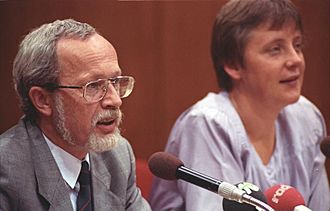
The fall of the Berlin Wall in November 1989 changed Merkel's life. She joined a new political party called Democratic Awakening. In February 1990, she became the party's press spokeswoman.
The Democratic Awakening party later joined the East German Christian Democratic Union. This party then merged with its western counterpart after Germany reunited. Merkel became a deputy spokeswoman for the last East German government.
Minister for Women and Youth
In the 1990 German federal election, Merkel was elected to the Bundestag. Soon after, Chancellor Helmut Kohl appointed her as the Minister for Women and Youth. This role helped her become known in politics.
Minister for the Environment
In 1994, Merkel became the Minister for the Environment and Nuclear Safety. This job gave her more public attention. She was one of Chancellor Kohl's youngest ministers, and he often called her "my girl."
As Environment Minister, Merkel helped organize the 1995 United Nations Climate Change Conference in Berlin. She played a key role in getting countries to agree to reduce greenhouse gas emissions.
General Secretary of the CDU
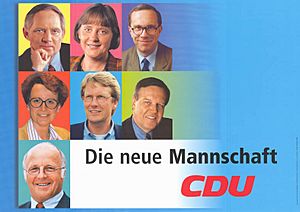
After the Kohl government lost the 1998 election, Merkel was chosen as the Secretary-General of the CDU. This was a difficult time for the party.
Merkel helped the CDU win several state elections in 1999. She also spoke out against a party funding scandal involving former leaders, calling for a fresh start for the party.
Leader of the CDU
On April 10, 2000, Merkel was elected to lead the CDU. She was the first woman to lead a major German political party. This was a surprise to many because she was a Protestant from northern Germany, while the CDU was traditionally a male-dominated party with strong roots in southern Germany.
In 2002, Merkel became the Leader of the Opposition in the Bundestag. She supported changes to Germany's economic and social systems. She also believed in a strong partnership between Germany and the United States. In 2003, she supported the invasion of Iraq, saying it was "unavoidable."
Chancellor of Germany (2005–2021)
First Term (2005–2009)
In 2005, Angela Merkel became the CDU/CSU candidate for Chancellor. After a close election, her party and the SPD formed a "grand coalition." On November 22, 2005, Merkel was elected Chancellor. She promised to focus on reducing unemployment.
Helping the Economy
Merkel's government faced the 2008 financial crisis. She helped coordinate efforts to stabilize the economy. Germany also expanded a program called Kurzarbeit, which helped save many jobs by allowing companies to reduce work hours instead of laying off employees.
Second Term (2009–2013)
Merkel's CDU party won the 2009 election again. They formed a new government with the FDP.
Ending Conscription
In 2010, the German government decided to end conscription, which meant young people no longer had to serve in the military. This made the German army a volunteer force. This decision was finalized in 2011.
Third Term (2013–2017)
In the 2013 election, Merkel's party won a big victory. However, their preferred partners, the FDP, did not get enough votes to enter parliament. So, the CDU/CSU formed another "grand coalition" with the SPD.
The Migrant Crisis
In 2015, Europe faced a large European migrant crisis. Merkel encouraged European countries to work together. Germany decided to process asylum applications from Syrian refugees, even if they had arrived in other EU countries first. That year, nearly 1.1 million asylum seekers came to Germany. Merkel famously said, Wir schaffen das (meaning 'We can do this').
This decision led to strong debates in Germany. Some people supported her policy, while others were against it. Merkel's approval ratings went down for a while but later recovered.
Fourth Term (2018–2021)
In the 2017 election, Merkel's party won again, but with fewer votes. After long negotiations, they formed a third "grand coalition" with the SPD.
COVID-19 Pandemic
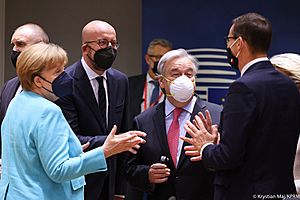
During the COVID-19 pandemic, Merkel's government set up a crisis team. In March 2020, she gave a speech comparing the pandemic's challenges to World War II. She was praised for her calm and clear communication. She also played a key role in creating the "Next Generation EU" recovery package for Europe.
End of Chancellorship
In October 2018, Merkel announced she would not seek re-election as CDU leader. She also said she would not run for chancellor again in 2021. She wanted to remain chancellor until the 2021 election.
In the 2021 German federal election, the SPD won the most votes. After negotiations, Olaf Scholz was chosen to succeed Merkel. Merkel officially left office on December 8, 2021.
After Being Chancellor (2022–Present)
After leaving office, Angela Merkel has mostly stayed out of politics. However, she has spoken out about the Russian invasion of Ukraine. In February 2022, she strongly condemned Russia's actions, calling it a "profound break in the history of post-Cold War Europe."
In June 2022, she defended her past decisions regarding Ukraine. She called Putin's aggression "a major mistake from Russia" and a "breach of all international laws."
Merkel wrote a memoir called Freedom with her longtime assistant, Beate Baumann. It was released in November 2024.
Political Views
Immigration and Refugees
In 2010, Merkel said that attempts to build a multicultural society in Germany had "utterly failed." She believed immigrants should integrate and adopt German culture and values. She also supported a system for sharing asylum-seekers among EU countries.
Foreign Policy
Merkel's foreign policy focused on strengthening European cooperation and international trade. She was often seen as the unofficial leader of the European Union during her time as Chancellor. She attended every G20 meeting since the first one in 2008.
She supported an agreement between Ukraine and the European Union. She also expressed support for Israel's right to self-defense.
Climate Policy
Merkel was important in the 2007 G8 negotiations, which led to stronger commitments for renewable energy. Germany also started a long-term plan called Energiewende (Energy Transition) to move towards sustainable energy. After the Fukushima nuclear disaster, Germany decided to phase out all nuclear power plants. The last ones were shut down in April 2023.
In 2015, Merkel announced that Germany would increase its contributions to international climate aid. In 2019, her government approved a plan to phase out coal power plants by 2038.
Personal Life
In 1977, Angela Kasner married physics student Ulrich Merkel and took his last name. They divorced in 1982. Her second husband is Joachim Sauer, a quantum chemist and professor. They married in 1998. Merkel does not have children, but Sauer has two sons from a previous marriage.
Having grown up in East Germany, Merkel learned to speak Russian fluently. She could speak informally with Vladimir Putin in Russian. She rarely spoke English in public.
Merkel is a big football fan. She would listen to games in parliament and attend matches of the German national team.
Merkel has a fear of dogs, which started after she was attacked by one in 1995.
In September 2021, Merkel stated that she considered herself a feminist. Since retiring, she has focused on traveling and private events.
Religion
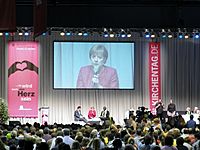
Angela Merkel is a member of the Evangelical Church in Berlin, Brandenburg and Silesian Upper Lusatia, which is a Protestant church. She has said, "I believe in God and religion is also my constant companion, and has been for the whole of my life." She also stated that Germany suffers not from "too much Islam" but "too little Christianity."
In Media
Angela Merkel has been portrayed in various films and TV shows. Swiss actress Anna Katarina played her in the 2012 film The Dictator. On the American show Saturday Night Live, she was parodied by Kate McKinnon. British comedian Tracey Ullman also parodied Merkel on her show.
In 2016, a documentary film called Angela Merkel – The Unexpected was made about her. In 2024, a German TV show called 'Miss Merkel' reimagined her as a detective. It is a comedy based on popular novels.
Images for kids
See also
 In Spanish: Angela Merkel para niños
In Spanish: Angela Merkel para niños


